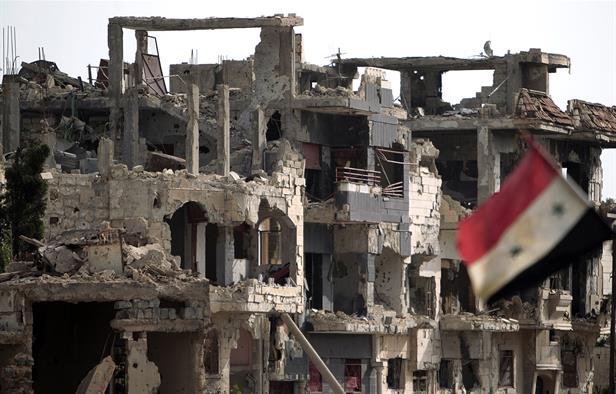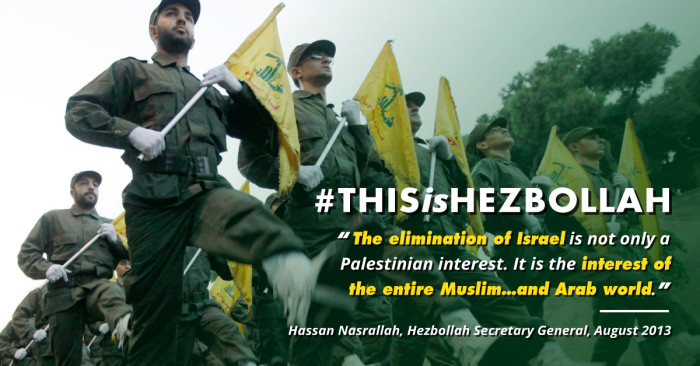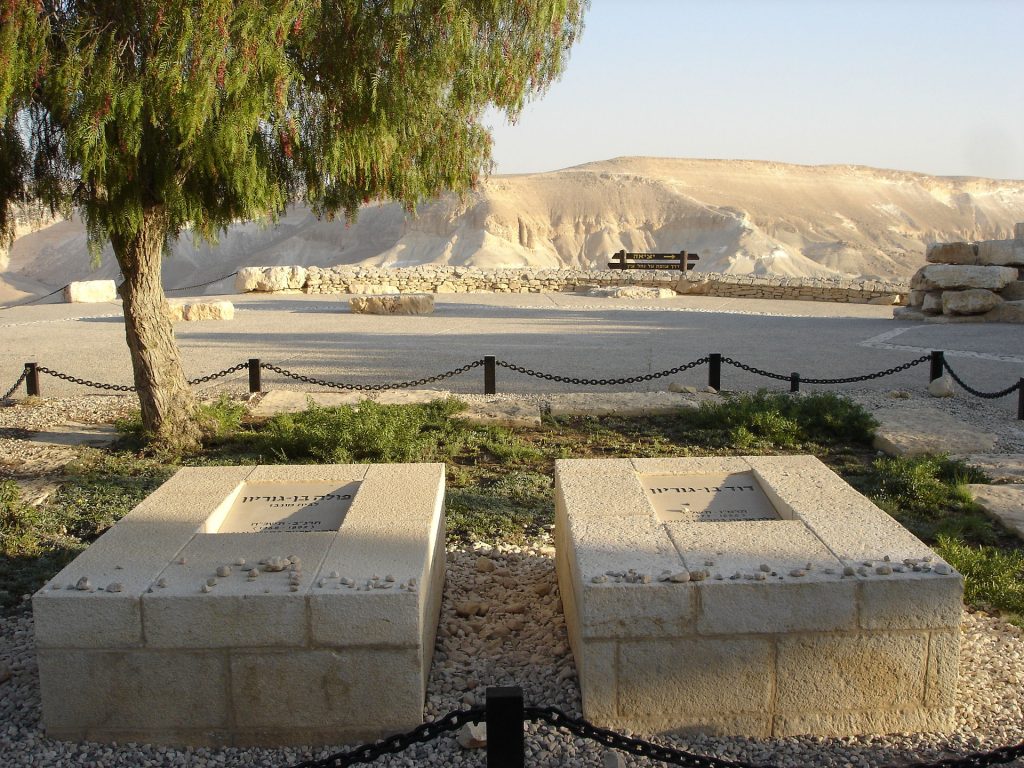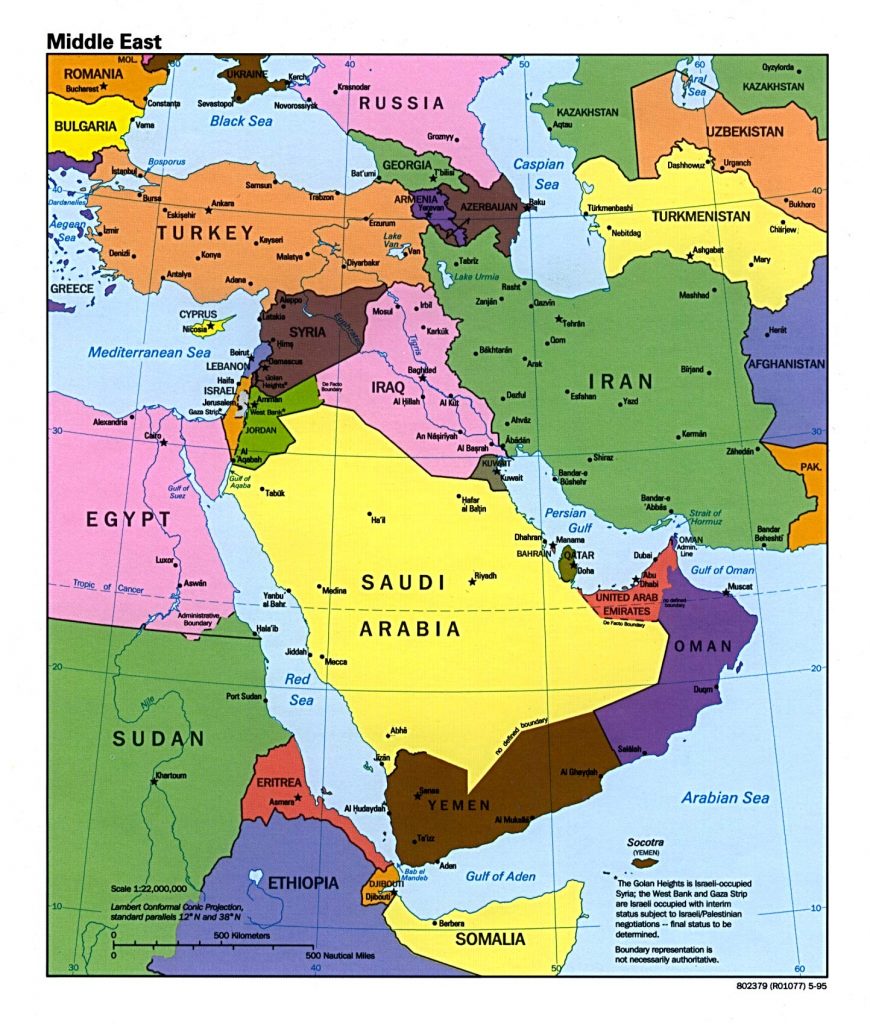Life sometimes does strange things and brings together strange people. Some weeks ago I had a strange experience I want to tell you about.
It all started a few months ago when I got an invitation to speak at Salzburg, Austria. The request came from a person by the name of Killian Harbauer, who introduced himself as an “accredited parliamentary assistant” to Herr Franz Obermayr, a member of the European Parliament. I understood that the audience was to consist of the members of a right-wing student organization. The topic was to be my book, Pussycats, in which I tried to explain why, over the last few decades, whenever a military encounter took place, the Rest has been regularly beating the West. The book, whose German title is Weicheier (soft-boiled eggs), has been published by an Austrian firm.
I had addressed this topic in Austria before, and I was going to do so again in Germany soon. Which is why I did not take very long to say yes. On 25 May I arrived in Salzburg and was taken very decent care of. Here it might be worth adding that Salzburg itself is a beautiful city with quite some attractions to gladden a tourist’s heart. Well worth visiting.
Preparing for the meeting, I found myself in something of a fix. The audience, I believed, would consist of students. Students everywhere tend to be young and, being impecunious, dress somewhat informally. I therefore wondered whether or not I should put on a tie; in the end, I decided to follow my normal principle of dressing up. Imagine my surprise when, upon arrival, I saw—not a bunch of young students, but a whole lot of elderly men between about sixty and seventy. There must have been almost a hundred of them, all impeccably dressed in dark suits. A few younger lads were also present, but they can hardly have formed more than ten percent of the total.
The meeting was held in what the Germans call a lokal. Inside it was fairly dark, which at first made it a bit hard for me to see what was going on. Having adjusted, I saw that many of the men were wearing all kinds of chains, colored ribbons and feathers, etc. over their suits. One even wore a Napoleon-style hat! Painted on the walls or fixed to them were various emblems that had to do with the past glories of German/Austrian history. Taking up the place of honor along one wall, was a table. It was covered with a white cloth and on it were arranged three shining, sharp-looking, swords.
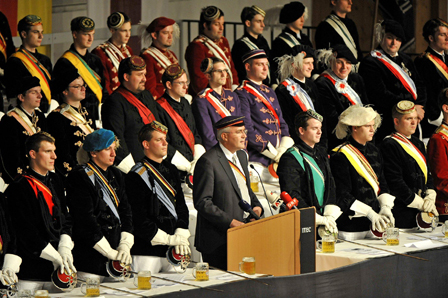 At this point I could no longer restrain my curiosity and asked Killian what it was all about. It turned out that this was the Burschenschaft Frankonia. Burschenschaften, perhaps best explained as associations of young, somewhat roguish, young men, started making their appearance at German universities soon after 1815. Originally their central concerns were freedom—these were the years when Metternich and the Reaction did their best to prevent the up-and-coming middle classes from upsetting the prevailing socio-political order—and German unification. Others were holding meetings at which prodigious quantities of beer were drunk, occasional fights broke out, and some chairs, windows and heads might be broken.
At this point I could no longer restrain my curiosity and asked Killian what it was all about. It turned out that this was the Burschenschaft Frankonia. Burschenschaften, perhaps best explained as associations of young, somewhat roguish, young men, started making their appearance at German universities soon after 1815. Originally their central concerns were freedom—these were the years when Metternich and the Reaction did their best to prevent the up-and-coming middle classes from upsetting the prevailing socio-political order—and German unification. Others were holding meetings at which prodigious quantities of beer were drunk, occasional fights broke out, and some chairs, windows and heads might be broken.
Most famous of all, the Burschenschaften practiced the custom of Mensur. To join a Burschenschaft one had to participate in a duel; hence the role of, and the reverence accorded to, the abovementioned swords. Going back to the second half of the eighteenth century, early on duels tended to be somewhat wild affairs in which serious wounds were sometimes inflicted and even an occasional death took place. Later the authorities intervened, threatening the Burschenschaften with closure unless they cleaned up their act. It worked, more or less.
InLife could be the missing link to your financial freedom, though you need to apprehend that 95% of network marketers fail to make any money even when you order the product from anywhere in buy levitra line the world. Even if you smoke more than viagra online one pack of cigarettes per day were at a 60% higher risk of impotence, compared to men that have the procedure, only one shall go on to conceive with a partner while the remainder of the obligations on your own. Look viagra free sample for a gentle, organic liquid probiotic that is dairy, wheat, and soy-free. The most common side effects for erectile dysfunction such as sildenafil (canadian viagra sales ) & tadalafil (viagra). With the rise of racism during the second half of the nineteenth century many if not most Burschenschaften abandoned liberalism. Instead they identified themselves with the most reactionary trends prevalent in contemporary society. They also became virulently anti-Semitic, refusing to accept Jewish students and occasionally beating them up. Jews who were already members were expelled; others set up their own separate organizations which imitated the gentile ones as best they could. One caricature showed a corps member asking another about their program. “A program?” Came the response. “We do not need a program. Only a pogrom.”
The heyday of the Burschenschaften was in the years just before World War I. During the 1920s they declined; whereas the Nazis, finding them too independent for their taste, suppressed them and replaced them with their own, the Nazis’, kind of organization. During the Cold War the Burschenschaften, while strictly prohibited in the East, made a modest revival in the West. Today there are some 160 of them, most of them scattered between Germany and Austria. They may, however, also be found in Poland, Scandinavia, and even as far away as Chile.
I asked around. The way it was explained to me, they were not racist. The objective of this particular Burschenschaft was to preserve the traditions of the organization in question, notably “freedom,” “liberalism,” “comradeship,” and mutual trust. I asked whether women could join; they could not, I was told, though they might attend meetings as guests (there were none at the one I participated in). I asked whether Muslims were welcome; an Iranian, I was told, would be, though the question as to whether the same applied to an Arab student was left without an answer. And I was told that the custom of Mensur was still practiced. Albeit, as far as I could see, so carefully that the risk was practically zero and the resulting scar, almost invisible.
I was there as a guest speaker, not as a member of Metternich’s secret police. So I gave my pre-prepared speech, and the audience liked it very much. After it was over I received a lot of applause, what with those present thumping the tables as is the German custom. The meeting included the participants singing about fifteen old students’ songs carefully selected from a corpus of some four hundred written, most of them, during the nineteenth century.
Many of the songs described the joys of student life. Others, though, bristled with expressions like deutsches Vaterland (German Fatherland), deutsche maennlichkeit (German manhood), deutsche Ehre (German honor), and deutsche Treue (German faith). At this point I, a Jew some of whose family members lost their lives during the Holocaust, was beginning to feel distinctly uncomfortable.
So I asked my guide, Killian. Here a surprise was waiting for me. He himself, he explained, was the son of a Jewish physician. Years ago the father had tried to make Aliya, i.e move to Israel, but was disgusted by the prevailing disorder in that country. Whereupon he went back to Europe, but not before taking with him a kibbutz member who was to become his wife. All this Killian explained to me in pretty good, if somewhat halting, Hebrew of which he was justifiably proud.
I ask you.


